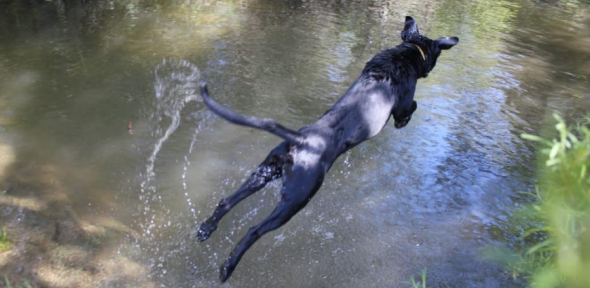
Submitted by S. Di Eleonora on Mon, 17/03/2025 - 12:32
Dr. Natalie Wallis and Dr. Alyce McClellan, both alumnae of the Cambridge Biosciences DTP programme (2019 cohort), are joint first authors on a groundbreaking study published in Science.
Led by Dr. Eleanor Raffan from the Department of Physiology, Development and Neuroscience, the research has identified genes linked to obesity in both Labrador retrievers and humans—offering new insights into the genetic factors driving weight gain.
Researchers studying British Labrador retrievers have identified multiple genes associated with canine obesity and shown that these genes are also associated with obesity in humans.
The dog gene found to be most strongly associated with obesity in Labradors is called DENND1B. Humans also carry the DENND1B gene, and the researchers found that this gene is also linked with obesity in people.
DENND1B was found to directly affect a brain pathway responsible for regulating the energy balance in the body, called the leptin melanocortin pathway.
An additional four genes associated with canine obesity, but which exert a smaller effect than DENND1B, were also mapped directly onto human genes.
"These genes are not immediately obvious targets for weight-loss drugs, because they control other key biological processes in the body that should not be interfered with. But the results emphasise the importance of fundamental brain pathways in controlling appetite and body weight” — Alyce McClellan
"We found that dogs at high genetic risk of obesity were more interested in food,”
“We measured how much dogs pestered their owners for food and whether they were fussy eaters. Dogs at high genetic risk of obesity showed signs of having higher appetite, as has also been shown for people at high genetic risk of obesity” — Natalie Wallis.
The study found that owners who strictly controlled their dogs’ diet and exercise managed to prevent even those with high genetic risk from becoming obese - but much more attention and effort was required.
Similarly, people at high genetic risk of developing obesity will not necessarily become obese, if they follow a strict diet and exercise regime - but they are more prone to weight gain.
The study underscores the complex relationship between genetics, appetite, and obesity. Similar to humans, no single gene determines whether a dog becomes obese—rather, a combination of multiple genetic variants contributes to risk.
“Studying the dogs showed us something really powerful: owners of slim dogs are not morally superior. The same is true of slim people. If you have a high genetic risk of obesity, then when there’s lots of food available you’re prone to overeating and gaining weight unless you put a huge effort into not doing so,” said Dr Eleanor Raffan. She added: “By studying dogs we could measure their desire for food separately to the control owners exerted over their dog’s diet and exercise. In human studies, it’s harder to study how genetically driven appetite requires greater willpower to remain slim, as both are affecting the one person.”
The rising obesity epidemic in humans is mirrored in dogs, with 40-60% of pet dogs now overweight or obese - leading to significant health concerns. Researchers have identified genetic links to obesity in dogs, offering valuable insights into human obesity.
By analysing DNA samples and body fat measurements from pet Labradors, the team discovered that dogs carrying a genetic variant in the DENND1B gene had approximately 8% more body fat. This gene is also associated with obesity in humans.
Because dogs share similar environmental influences with humans and have high genetic similarity within breeds, they serve as a useful model for studying obesity. The findings suggest that while genetics play a role, careful diet management and exercise can help prevent weight gain. Researchers recommend strategies such as using puzzle feeders or adjusting nutrient composition to keep dogs satisfied while maintaining a healthy weight.
Dr. Raffan concluded: “This study not only advances our understanding of obesity in dogs but also provides crucial insights into how our own brains control appetite and energy use.
The research was funded by Wellcome, the BBSRC, Dogs Trust, Morris Animal Foundation, MRC, France Genomique consortium, European Genomic Institute for Diabetes, French National Center for Precision Diabetic Medicine, Royal Society, NIHR, Botnar Foundation, Bernard Wolfe Health Neuroscience Endowment, Leducq Fondation, Kennel Club Charitable Trust.
Reference
Wallis, N.J. et al: ‘Canine genome-wide association study identifies DENND1B as an obesity gene in dogs and humans.’ Science, March 2025. DOI: 10.1126/science.ads2145
Adapted from the University press release: Scientists identify genes that make humans and Labradors more likely to become obese | University of Cambridge



